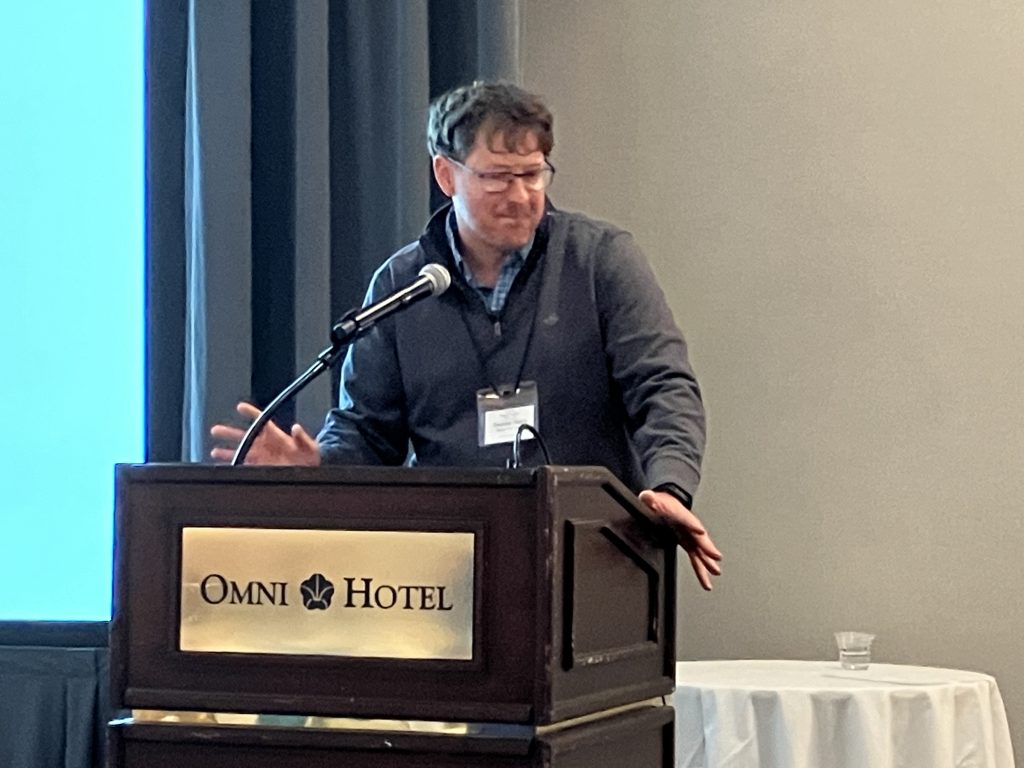At the annual Virginia Vineyards Association meeting on Feb. 21st, Virginia Secretary of Agriculture Matthew Lohr presented the annual Grower of the Year Award to Tremain Hatch, of Zephaniah Vineyards in Loudoun County. “He has been involved in the industry since he was a teenager and has become one of the most respected viticulturists in the state. His determination and drive have helped Virginia’s wine industry to thrive and become a tremendous economic driver for the Commonwealth,” said Lohr in his presentation remarks.

While still in high school, Hatch helped plant the first acre of his family’s vineyard which has now grown to 10 acres of 18 varieties. Hatch earned a Master’s degree in viticulture from Virginia Tech in 2010, then became a viticulture extension associate at Virginia Tech’s Alson H. Smith Jr. Agricultural Research and Extension Center at Winchester. Hatch has continued doing research projects and sharing the results with the industry. He even traveled to Japan with Virginia Tech’s plant pathologist, Mizuho Nita, and the two presented workshops and tastings of Virginia wine, and performed a dozen vineyard evaluations. We had the opportunity to interact with over 200 growers in three weeks,” he said. “As a result, Tremain is now a well-known viticulturist in Japan, too,” says Nita.
AJ Greely, the new president of the VVA, adds “We’ve all come to know his smile and his engaging way,” she added. “Not only is he a standout for his work at Zephaniah but having him in our industry is a benefit for all of us. He is more than deserving of this award.”
The 2024 annual meeting sold out at 250 attendees, says Tracy Kirkman, VVA Business Manager. The two-day conference program was designed by Jeanette Smith, chair of the Research Committee, and Kirkman says she’s had lots of compliments on the program.
Climate change and how to deal with it was the overriding theme of the conference. For example, “Climate Change Influences & Impacts On Virginia Viticulture & Wine Production” was presented by Dr. Greg Jones, wine climatologist and CEO of Abacela Vineyards in southern Oregon; “Virginia Grape Breeding Program Updates” was presented by Dana Amicovic of Virginia Tech, & “Grape Varieties For A Changing Climate” was presented by Jeanette Smith, of Vinesmith Consulting.
New research was presented on chitosan as a low-risk fungicide and a futuristic, exciting program on evaluating potential new grape varieties for downy mildew resistance using DNA marker analysis.
Funding was approved by the state for this research, also supported by the USDA and others, from the Virginia Wine Promotion Fund “for the purpose of breeding vinifera-style wine grapes adapted to the Mid-Atlantic US with a specified focus on combining vinifera fruit quality with downy mildew resistance, with an objective of commercializing the resulting variety within 10 to 15 years.”
Dr. Surya Sapkota, grape breeder of the USDA presented on this grape breeding program in Virginia. Their top priority is to make new varieties that are powdery mildew-resistant. Crosses were made manually in 2022-23 in Virginia and New York, yielding 7,000 plants for evaluation. To evaluate qualities, they extract DNA at an early stage (in a leaf sample), and can evaluate whether a variety is resistant to downy mildew or not, looking at DNA markers, and improved phenotyping helped to screen vines with disease resistance and good winemaking characteristics. They can select for the specific DNA markers for down mildew resistance. Then it’s easy to select or eliminate varieties from the greenhouse that don’t have qualities in the DNA that you want, then plant desirable seedlings in a new vineyard.
Four thousand vines are now planted from 22 families from 15 resistant sources. Walsh family, Jason Murray/Arterra, Emily Hodson and Ben Jordan helped by growing samples in their vineyards.
It’s important to emphasize that this breakthrough technology is NOT GM, since no DNA is manipulated, added or subtracted; only specific markers are identified, to select new crosses and eliminate others.
One session featured four top Virginia Norton wines, as winemakers shared what they felt were the pros and cons of Virginia’s original wine grape, and how they dealt with challenges in the vineyard and winery. Viticulturist Lucie Morton explained that, as early as the 1870s, viticulturists were describing distinct differences between what is described as Cynthiana in the Midwest, and what is Norton. She demonstrated that the cluster size, wine color, and leaf shape are all different between Cynthiana and Norton, but cautions that it’s too early to declare them clonal differences since clones evolve over a very long time, and Norton has only existed for 100 years.
Most of the Nortons were from the recent 2021 vintage, and all were of excellent quality. Two of the four winemakers shared that they had decided to use French instead of American oak to make a more elegant wine, and they had succeeded. Shep Rouse shared a library Norton (labeled Monticello Wine Co. Extra Virginia Claret 2004) which demonstrated clearly that well-made Norton can age very well.
